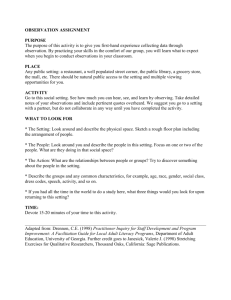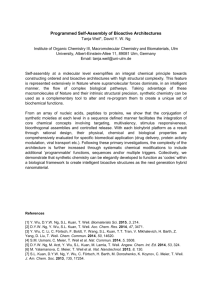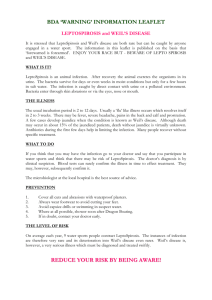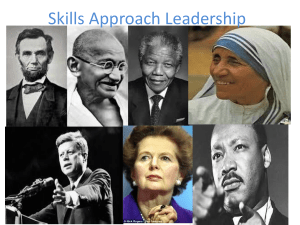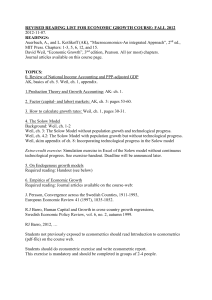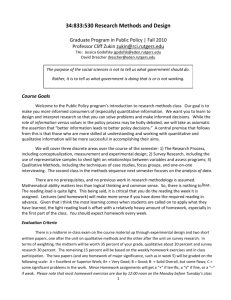T U N C
advertisement
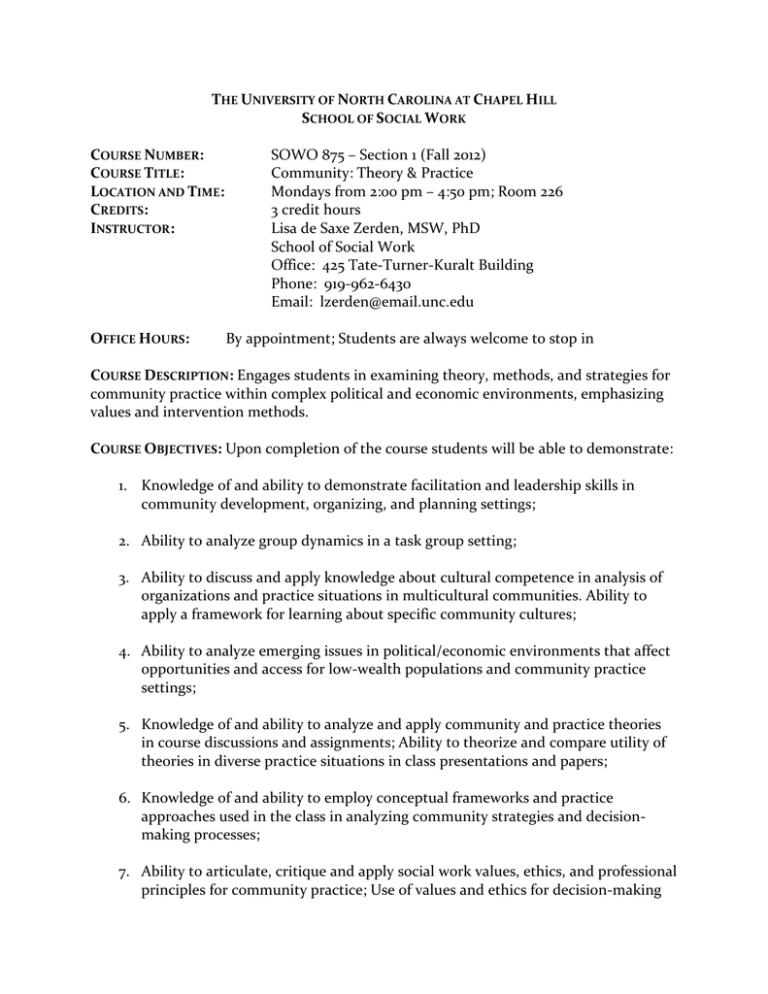
THE UNIVERSITY OF NORTH CAROLINA AT CHAPEL HILL SCHOOL OF SOCIAL WORK COURSE NUMBER: COURSE TITLE: LOCATION AND TIME: CREDITS: INSTRUCTOR: OFFICE HOURS: SOWO 875 – Section 1 (Fall 2012) Community: Theory & Practice Mondays from 2:00 pm – 4:50 pm; Room 226 3 credit hours Lisa de Saxe Zerden, MSW, PhD School of Social Work Office: 425 Tate-Turner-Kuralt Building Phone: 919-962-6430 Email: lzerden@email.unc.edu By appointment; Students are always welcome to stop in COURSE DESCRIPTION: Engages students in examining theory, methods, and strategies for community practice within complex political and economic environments, emphasizing values and intervention methods. COURSE OBJECTIVES: Upon completion of the course students will be able to demonstrate: 1. Knowledge of and ability to demonstrate facilitation and leadership skills in community development, organizing, and planning settings; 2. Ability to analyze group dynamics in a task group setting; 3. Ability to discuss and apply knowledge about cultural competence in analysis of organizations and practice situations in multicultural communities. Ability to apply a framework for learning about specific community cultures; 4. Ability to analyze emerging issues in political/economic environments that affect opportunities and access for low-wealth populations and community practice settings; 5. Knowledge of and ability to analyze and apply community and practice theories in course discussions and assignments; Ability to theorize and compare utility of theories in diverse practice situations in class presentations and papers; 6. Knowledge of and ability to employ conceptual frameworks and practice approaches used in the class in analyzing community strategies and decisionmaking processes; 7. Ability to articulate, critique and apply social work values, ethics, and professional principles for community practice; Use of values and ethics for decision-making in settings where different values and interests are in competition and where there are significant power differentials; 8. Ability to explain and appreciate the competing demands that multiple stakeholders place on community-based organizations, and the multiple expectations and demands placed on community practitioners; 9. Ability to integrate theory, knowledge, research findings, and skills to demonstrate advanced practice competencies such as: building a diverse and culturally competent community organization; coordinating the work of diverse groups in communities; and building a shared culture in an organization or community group that appreciates the strengths of oppressed populations; 10. Knowledge of current trends, issues, and studies that shape and influence organizing, planning, and development processes in community-based organizations and communities in relation to students’ special interest projects; and 11. Ability to demonstrate and teach selected knowledge, skills and competencies for community practice in class presentations. EXPANDED DESCRIPTION: This course builds on learning from the MSW foundation year, particularly from SoWo570: Social Work Practice with Organizations and Communities and provides grounding for electives offered by the Community Management and Policy Practice (CMPP) Concentration. The Concentration is designed to prepare graduates for leadership in community practice and management and provides requisite courses for the Certificate in International Development and the Certificate in Nonprofit Management. In addition to full time CMPP students, concentration courses are also often taken by students completing advanced degrees in Public Health, Public Administration, among other dual-degrees. The course focuses on theory and knowledge and on strategies needed for effective practice in community organizing, development, and planning. It emphasizes application of theory to practice settings and developing skills and competencies for community work in diverse settings. The content progresses through a range of major skill areas providing theory, case examples and experiential learning activities that relate to developing, facilitating, and exercising leadership in communities and in inter-organizational collaboratives. REQUIRED TEXTS/READINGS: Weil, M., Gamble, D.N., & MaGuire, E. (2010). Community practice skills workbook: Local to global perspectives. New York: Columbia University Press. This book will be referred to as CPS-Workbook throughout syllabus SOWO 875 Syllabus Fall 2012 – Zerden 2 Gamble, D.N., & Weil, M. (2010). Community practice skills (CPS): local to global perspectives. New York: Columbia University Press. This book will be referred to as CPS throughout syllabus Weil, M. (2012- in press). The handbook of community practice (2nd Ed.). Thousand Oaks, CA: Sage. *This book is not yet ready for purchase so select chapters will be posted on Sakai in proof format. It will be referred to as HCP throughout syllabus SELECTED TEXTS/READINGS: Bens, I. (2005). Advanced facilitation strategies: Tools & techniques to master difficult situations. San Francisco: Jossey Bass. Iglehart, A.P. & Becerra, R.M. (2010). Social services and the ethnic community: History and Analysis, Second Edition. Long Grove, IL: Waveland Press. RECOMMENDED TEXTS: Brueggemann, W. (2006). The practice of macro social work, 3rd edition. Belmont CA: Thomson—Brooks/Cole. Freire, P. (1993). Pedagogy of the oppressed. New York: NY: Continuum Delgado, M. (2000). Community social work practice in an urban context: The potential of a capacity enhancement perspective. New York: Oxford University Press. Hardcastle, D.A. (2012). Community practice: Theories and skills for social workers. New York, NY: Oxford. Ohmer, M. L. & DeMasi, K. (2008). Consensus organizing: A community development workbook. Thousand Oaks, CA: Sage. Sen, A. (2009). The Idea of Justice. Cambridge: Harvard University Press. Staples, L. (2004). Roots to power: a manual for grassroots organizing, 2nd edition. Westport, CT: Prager. Toseland, R.W. & Rivas, R. (2008). An introduction to group work practice, sixth edition. Upper Saddle River, NJ: Pearson-Allyn & Bacon. Other required readings are available on the Sakai in folders for each class session, or on Web sites discussed in class. Students are expected to select and use relevant literature and research from professional journals in major assignments. EXPECTATIONS FOR WRITTEN ASSIGNMENTS: Students are expected to use good academic English; grades will be lowered for poor grammar, syntax, or spelling. Those who have difficulty writing are strongly encouraged to use online resources of the campus Writing Center (http://www.unc.edu/depts/wcweb/) and/or seek assistance from Diane Wyant or Susan White who can provide excellent writing support. The School of Social Work faculty has adopted APA style as the preferred format for papers and publications. All written assignments for this course should be submitted in APA style unless otherwise explained. Information concerning APA style and writing resources are listed below: SOWO 875 Syllabus Fall 2012 – Zerden 3 American Psychological Association. (2009). Publication manual of the American Psychological Association, 6th Edition. Washington, D.C.: American Psychological Association. http://www.apastyle.org/elecref.html (APA Style for material in electronic formats) http://owl.english.purdue.edu/handouts/research/r_apa.html (general information about documentation using APA style) http://www.bartleby.com/141/ (electronic version of Strunk's The Elements of Style which was originally published in 1918) http://www.fas.harvard.edu/~wricntr/resources.html (The Writing Center, links to on-line reference material and many other useful sites for authors) http://www.unc.edu/depts/wcweb/ (The UNC writing center—on-line and tutorial help at Phillips Annex 962-7710) TEACHING METHODS: This advanced seminar will employ both cognitive and experiential learning approaches. Students will be expected to facilitate discussions on application of theories to community practice and to theorize about practice situations. Students will engage in a variety of experiential exercises, lead exercises in areas of particular interest, and make professional level presentations. Brief lectures and work in small groups will be employed in the class as well as general class discussion. Students are expected to work together to build a positive, learning-focused culture in the class and to model the collaborative, analytic, and mutual planning approaches that are critical for community practice. Students will be expected to employ professional ethics and values and to actively practice facilitation and problem-solving skills. Students are expected to treat the class as a professional venue in which all participants are committed to learning and practice that can strengthen communities and organizations, and enact values promoting social justice and human rights—especially for vulnerable populations and those that historically and/or currently experience exclusion, discrimination, or oppression. Students are expected to actively participate, drawing from readings, assignments, internships, and your previous or current work and/or volunteer experience. The instructor will be available during office hours or by appointment, telephone and e-mail to address questions that arise. The development of a supportive learning environment, reflecting the values and ethics of the social work profession, is essential for this class. Since the majority of work for most community practitioners involves working with task groups, the class will provide an opportunity for testing, modeling, and expanding skills in this area. GRADING SYSTEM: The School of Social Work operates on an evaluation system of Honors (H), Pass (P), Low Pass (L), and Fail (F). The numerical values of these grades are: H= 94-100 points; P= 8093 points; L= 70-79 points; you will receive an F if you 69 or fewer points. SOWO 875 Syllabus Fall 2012 – Zerden 4 A grade of P is considered entirely satisfactory. The grade of Honors (“H”) — which only a limited number of students attain -- signifies that the work is clearly excellent in all respects. Grading guides for all written work can be found on Sakai. These guides identify grading criteria for each assignment, including the relative weight of each criterion. Therefore, students are advised to closely follow the guides, as they constitute the Instructor’s expectations and evaluation methodology for these assignments. POLICY ON INCOMPLETES AND LATE ASSIGNMENTS: A paper is considered late if it is handed in any later than the start of class on the day it is due. The grade for late papers will be reduced 10% per day, including weekends. Therefore, a paper due at 2pm on Monday and handed in at 3pm will be considered 1 day late. A grade of Incomplete is given only in exceptional and rare circumstances that warrant it, e.g. family crisis, serious illness. It is the student’s responsibility to request and explain the reasons for an Incomplete. The instructor has no responsibility to give an Incomplete without such a request. POLICY ON ACADEMIC DISHONESTY: It is the responsibility of every student to obey and to support the enforcement of the Honor Code, which prohibits lying, cheating, or stealing in actions involving the academic processes of this class. Students will properly attribute sources used in preparing written work and will sign a pledge on all graded coursework certifying that no unauthorized assistance has been received or given in the completion of the work. All written assignments should contain a signed pledge from you stating: “I have not given or received unauthorized aid in preparing this written work. This work was created for this course and has not been submitted previously or concurrently for another course.” Credit will not be awarded for unpledged work. Please refer to the APA Style Guide, The SSW Manual, and the SSW Writing Guide for information on attribution of quotes, plagiarism and appropriate use of assistance in preparing assignments. In keeping with the UNC Honor Code, if reason exists to believe that academic dishonesty has occurred, a referral will be made to the Office of the Student Attorney General for investigation and further action as required. POLICY ON ACCOMMODATIONS FOR STUDENTS WITH DISABILITIES: Students with disabilities that affect their participation in the course and who wish to have special accommodations should contact the University’s Disabilities Services (http://disabilityservices.unc.edu) and provide documentation of their disability. Disabilities Services will notify the instructor that the student has a documented disability and may require accommodations. Students should discuss the specific accommodations they require directly with the instructor. POLICY ON THE USE OF ELECTRONIC DEVICES IN THE CLASSROOM: Please set your cell phones to vibrate. Use of laptops is permitted as a tool for small group activities and in-class assignments or as an approved accommodation for students with disabilities. SOWO 875 Syllabus Fall 2012 – Zerden 5 OTHER POLICIES/GENERAL INFORMATION: For all class papers, please submit a hard copy at the start of class when the assignment is due. If you will be late or know you need to miss a class on the date something is due, an email will be accepted granted it comes in on time, by the start of class. COURSE ASSIGNMENTS: Students will be evaluated based on the following assignments: Class Attendance and Participation Assignment 2: Movie or Guest Speaker Critical Reflection Assignment 3: Reading Summary and Discussion Questions Assignment 4: Midterm Poster and paper Assignment 5: Final Project (paper 20% & presentation 20%) Total: 10% 10% 10% 30% 40% 100% 1. Class Attendance (10 points): As an advanced graduate seminar, this course has high expectations for reading, analyzing, and critiquing professional literature; engaging in class discussions and creative problem solving; participating in experiential exercises, analyzing case studies and practice experiences; leading assigned discussions and presenting your own work for collegial discussion. Your attendance and engagement is essential to learning. You will lose attendance points for missing class and by not participating during sessions. 2. Movie or Guest Speaker Critical Reflection (10 points): In this course we will view several videos and invite guest speakers (TBD) related to community practice that will cover different styles of leadership, mobilization, and success/challenges of specific case examples historically and presently. Students will pick one video (i.e, The Interrupters; The rebirth of Dudley Square; Saul Alinsky Biography piece; A walk to beautiful, and others TBD), or one speaker to write a 3-5 page critical reflection due by week 12. The below prompts are suggestive points to consider addressing in your critical review to frame your paper: a. General thoughts and areas of learning or challenges addressed? b. Who are the community leaders? How have they been successful given social, historical, political/economic context of their work? c. What are the unique strengths/challenges within this community? d. Who are the various stakeholders and what is their point of view? e. Are there parallel or differing comparisons to be made from other examples discussed thus far in class? f. What are the values in conflict expressed in the film or by the guest and how are these overcome or managed? You are encouraged to recommend other related video content that your professor can share with the class. Also, there will be 2 sessions when your professor will be at professional conferences. It is suggested you use class time to watch one of these films and ensure you are getting the content despite not meeting as a traditional class. SOWO 875 Syllabus Fall 2012 – Zerden 6 3. Reading Summary and Discussion Questions (10 points): Early in the semester (~ class 2), small groups will be formed to facilitate a class “kick off” for 15 to 20 minutes at the beginning of class. The intent of the kickoffs is to have students present what they think is important/valuable in the readings and to stimulate group discussion. Reading summaries should follow these guidelines: a. Discuss what group members felt were the most important ideas, theories, principles, concepts and/or practice skills from the readings for that week as applied to field, work or volunteer experience (past or present). b. Present what you think was most important in any format that you choose to stimulate discussion. c. Groups are not necessarily responsible for covering all of the readings in depth but rather offering an overview of main concepts. d. Groups are responsible for submitting written questions to instructor 24 hours in advance. 4. Midterm Poster and Paper (30 points): The midterm assignment involves the selection of a community practice model of interest to you and preparation of two products: (1) a poster; (2) a 4-6 page analytic and reflective paper (due the following week). For this assignment, students may choose one of the Weil/Gamble models or another model you wish to explore (please see your instructor before choosing a new model). Students will select two examples of the model as the focus of the paper and presentation: a. You can pick two models seen in the U.S.A b. If you are more interested in practice in the U.S. and transnational issues, select one domestic (your home country) and one international example in your selected model. c. If you are more interested in global work, you may compare two international examples. If your home country is not the U.S.A., you may use an example from the U.S. as your international example. d. Should you want to focus on two different models, speak with the instructor to plan an alternative presentation format. One example may be taken from your own previous experience if applicable; the other, or both, examples may be drawn from current literature, from web-based research, or from interviews with a current practitioner and your own observation. In class we will discuss the models and your plan for this assignment by week 4. The poster presentation will be ~ 10-15minutes long (depending on class size) during week 7. The posters will also be displayed in a class exhibit on the 5th floor of the School to educate other students about community practice. For the brief paper related to this poster, students will write a 4-6 page paper that documents the examination above in APA format. The paper can be turned in a week after the SOWO 875 Syllabus Fall 2012 – Zerden 7 poster presentation during week 8.The presentation and poster will inform the paper and vice versa. This assignment will be worth 30% of your grade and is due week 7 (poster), week 8 (paper). 5. Final Project: There are 2 options for the final assignment, explained below: Choice A Overview: Teaching and Facilitating Skills Presentation and Final Paper (Due Date between Week 6-14) Choice A will include 3 main components: 1.) Skills training (~20minutes) 2.) Training Handouts during training (1-2 page) 3.) Group Paper (8-10 pages) Individually, or in small groups (~3 people), students will select a particular skill or set of skills and facilitate a group exercise and teach the skill(s) to class members. The presentation should: (a) Introduce the exercise; (b) Set the stage and explain ground rules (c) Implement and facilitate the exercise; (d) De-brief; and (e) Highlight learning points (give handout) Areas may include any of the roles and skills covered in the CPS text, for example: grassroots group development, community development, program design, community strengths/needs assessments; conflict resolution, group or inter-group facilitation, interagency collaboration, coalition building or political advocacy (or other skill areas following approval from the instructor). The paper should include the following components: (a) A description and analysis of the skill area; (b) Discussion of related theory; (c) Discussion and analysis of the contexts, practice settings in which the skill is of major importance; (d) Rationale for when skill is appropriate (e) Recommendations on how to tech/train for this skill area; and (f) As a conclusion, a reflective summary of the experience of teaching the skill(s) to the class is required. The paper portion of the assignment is due one week after the teaching/learning session is conducted. Presentations will be built into the class schedule. Groups will suggest possible dates that they would like to present (that hopefully relate to readings when possible). SOWO 875 Syllabus Fall 2012 – Zerden Choice B Overview Special Interest Topic Presentation and Final Paper— with Handout of Teaching Points (Due Week 12-14) Choice B will include 2 main components: 1.) Topic paper (14-16 pages) 2.) Handout of teaching points/objectives This final paper option will focus on a topic of particular interest to the student and will include the following components: (a) An analysis of theory that guides practice in the chosen topic area; (b) Research related to the particular topic illustrating its value in CP or presentation of research-grounded or evidence-based practice examples. If there is no sound research base for the topic, discuss why the approach is considered useful and describe what kind of research is needed to evaluate the effectiveness of the approach(es) discussed; (c) An analysis of the major practice roles and skills required for effective practice in the topic area, and the basic practice methods applied in the approach or model(s); (d) An appraisal of why this topic area is of particular importance for current and emerging CP; and (e) A discussion of how to use the knowledge and skills and how it will inform your future work. Topics related to social and economic development; community planning; sustainable development; program development; interventions with particular groups/communities; consultation for multicultural or inter-group community work; coalition building; empowerment strategies; grassroots development and management; collaboration; organizing, or other areas of CP are appropriate topics. Videos and/or other media may be included briefly within the presentation (~10-15 min) which will be during weeks 12-14, and are done individually. This assignment is more like a “traditional” academic paper (15-17 pages max). While it presents analysis and discussion of skills; it does not require actual teaching of the skill(s). 8 CLASS SCHEDULE AND READING ASSIGNMENTS DATE 8/27 (wk 1) OBJECTIVES Review syllabus and class norms Overview of CP Contexts of CP in social work READINGS AND IN-CLASS EXERCISES DUE Weil, M. (2012). Introduction: Contexts and challenges for 21st Century Communities. In M. Weil (Ed.), HCP (Chapter 1). Thousand Oaks, CA: Sage. Gamble, D.N., & Weil, M. (2010). CPS: Communities and CP in local to global contexts (Chapter 1). In Class: CPS-Workbook: Chapter 1 9/3 No Class-- Labor Day “What does labor want? We want more schoolhouses, less jails; more books and less arsenals. More learning and less vice; more leisure and less greed; more justice and less revenge; in fact, more of the opportunities to cultivate our better natures”- Samuel Gompers 9/10 (wk 2) Historical context of CP in social work Challenges of macro social work: past and present Haynes, K. (1998). The one hundred-year debate: Social reform versus individual treatment. Social Work, 43(6), 501-509. Bruegemann, W.G. (2012-in press). History and context for CP in North America. In M. Weil (Ed.), HCP (Chapter 2). Thousand Oaks, CA: Sage. Recommended: Hardcastle, D.A (2011). The concept of communities in social work practice (Chapter 4). In Community Practice: Theories and skills for social workers (3rd edition). New York: Oxford University Press. In Class: Film: The Democratic Promise: Saul Alinsky and His Legacy 9/17 (wk 3) 9/24 (wk 4) Identify social problems and solutions using theoretical models for CP Issues related to social justice, human rights, personal and professional values Establish framework for understanding models of CP Gamble, D.N., & Weil, M. (2010). CPS: Conceptual frameworks and models for CP (Chapter 2). Gamble, D.N., & Weil, M. (2010). CPS: Theories and perspectives for CP. (Chapter 4). Chaskins, R. (2012-in press). Theories of Community. In M. Weil (Ed.), HCP (Chapter 5). Thousand Oaks, CA: Sage. Review models of CP Ohmer, M., & Brooks, F. (2012-in press). The practice of community organizing: Comparing and contrasting In Class: CPS-Workbook: Chapter 2 SOWO 875 Syllabus Fall 2012 – Zerden 9 DATE OBJECTIVES READINGS AND IN-CLASS EXERCISES DUE Analyze values and ethics for CP as they relate to models of practice Understand essential issues involved in conflict and consensus approaches to CP and decisions regarding using educational, collaborative, consensus building and advocacy strategies conflict and consensus approaches. In M. Weil (Ed.), HCP (Chapter 10). Thousand Oaks, CA: Sage. Gamble, D.N., & Weil, M. (2010). CPS: Neighborhood and community organizing. (Chapter 5). Pick 1 of the following readings that most fits w/ interests: Carlton-LaNey, I., Burwell, Y., & White, C. (2012-in press). Rural community practice: organizing, planning and development. In M. Weil (Ed.), HCP (Chapter 21). Thousand Oaks, CA: Sage. Bens, I. (2005). Conflict management strategies, Chapter 3 in Advanced Facilitation Strategies. San Francisco, CA: Jossey-Bass. Reisch, M.(2012-in press). Radical community organizing. In M. Weil (Ed.), HCP (Chapter 16). Thousand Oaks, CA: Sage. By end of class #4, students will discuss their model of practice topic for poster with the Professor Recommended: Gamble, D.N., & Weil, M. (2010). CPS: Evolution of values, concepts and CP approaches. (Chapter 3). In Class: CPS-Workbook: Chapter 3 and Chapter 4 10/1 (wk Explore role of 5) popular education and citizen empowerment Assess strengths and weaknesses of CP approaches in diverse populations, supporting human rights, varied interests, and confronting social justice 10/8 (wk 6) Understand principles for building culturally competent organizations. Understand principles of building culturally competent services. Present strategies Reisch, M., Ife, J., & Weil, M. (2012-in press). Social justice, human rights, values and CP. In M. Weil (Ed.), HCP (Chapter 4). Thousand Oaks, CA: Sage. Gamble, D. (2012-in press). Participatory methods in community practice. In M. Weil (Ed.), HCP (Chapter 14). Thousand Oaks, CA: Sage. Gamble, D.N., & Weil, M. (2010). CPS: Organizing functional communities (Chapter 6). In Class: Kate Fellman, Durham People’s Alliance; CPS-Workbook: Chapter 6 Castelloe, P., Watson, T., & White, C. (2002). Participatory change: An integrative approach to community practice. Journal of Community Practice, 10(4), 7-31. St. Onge, P. (2012-in press). Cultural Competency: Organizations and diverse populations. In M. Weil (Ed.), HCP (Chapter 19). Thousand Oaks, CA: Sage. Pick 1 of the following readings that most fits w/ interests: Igelhart, A., & Baccera, R. (1995). Social Services and the Ethnic Community (Chapter 7). Service delivery to diverse communities: agency-focused obstacles and pathways (pp.205-239). SOWO 875 Syllabus Fall 2012 – Zerden Make decision on final project: (Choose option A or B so groups can be formed and dates 10 DATE OBJECTIVES for promoting multicultural communication and collaboration READINGS AND IN-CLASS EXERCISES Gutierrez, L, Lewis, E. Dessel, A. & Spencer, M. (2012-in press). Principles, skills, and practice strategies for promoting multicultural communication and collaboration. In M. Weil (Ed.), HCP (Chapter 20). Thousand Oaks, CA: Sage. Sen, R. (2012-in press). New theory for new constituencies: Contemporary organizing in communities of color. In M. Weil (Ed.), HCP (Chapter 11). Thousand Oaks, CA: Sage. DUE set) In Class: Bens Activity: The Five Rules of Facilitation, pp. 41-43. 10/15 (wk 7) 10/22 (wk 8) Review types of task groups and differential group dynamics and processes Apply problemsolving models to community task groups and facilitation Review dimensions of group dynamics and distinctions between the roles of facilitator and formal leader Toseland, R.W. & Rivas, R.F. (2011). An Introduction to Group Work Practice Seventh Edition. Chapters 1 (overview of groups) and 11 on Work with Task Groups. New York: Allyn & Bacon. Brueggemann, (2006). Leadership: The Hallmark of Macro Social Work, Chapter 4. The practice of macro social work. Belmont, CA: Thomson—Brooks/Cole. Recommended: Bens, (2005). The Complexities of Decision Making, Chapters 1 & 5 in AFS. Staples, L. (2006). Social action groups, In C.D. Garvin, L.M. Gutierrez, & M.J. Galinsky (Eds). Handbook of Social Work with Groups. New York: Guilford Press. pp. 344-359. Bratiotis, C. (2011). The Hoarding Handbook. Working with service delivery systems: Hoarding task force model (Chapter 3). New York, NY: Oxford University Press. In Class: CPS-Workbook: Chapter 5 on “Cardstorming” Guest Lecturer: Erica Snyder, Salvation Army, anti-human trafficking Present Poster to Class (10-15 min) exact time TBD based on class size Continue discussion on participatory methods in CP Community based participatory /action research methods; compare approaches to evaluating community change efforts Assess how to engage in CBPR, Ohmer et al. (2012-in press). Community-based research: rationale, methods, roles and considerations for community practice. In M. Weil (Ed.), HCP (Chapter 38). Thousand Oaks, CA: Sage. Buchanan, D.R., Miller, F.G., & Wallerstein, N. (2007). Ethical issues in community-based participatory research: Balancing rigorous research with community participation in community intervention studies. Progress in Community Health Partnerships: Research, Education and Action, 1(2), 153-160. Recommended: Stoecker, R. (2012). Research methods for community change: A project-based approach (Chapter 2). Los Angeles, CA: Sage. Paper portion of midterm due SOWO 875 Syllabus Fall 2012 – Zerden **We may need to carry over to next week** 11 DATE OBJECTIVES CBAR, and Empowerment Research 10/29 (wk 9) 11/5 (wk 10) READINGS AND IN-CLASS EXERCISES DUE In Class: Case Examples CBPR/CBAR Amanda Henley, Guest Lecture from GIS Librarian Analyze strategies to ensure inclusive program development (i.e., all stakeholders— including participants or those to be served) Weigh the pros and cons of developing new programs and organizations vs. forming alliances and coalitions with existing ones. Identify traits for successful interorganizational working relationships Gamble & Weil, (2010). Inclusive Program Development, Chapter 8 in CPS Netting, E. & O’Connor, M.K. (2012-in press). Program planning and implementation: Designing responses to address community needs. In M. Weil (Ed.), HCP (Chapter 36). Thousand Oaks, CA: Sage. Lauffer, A. (2012-in press). Fundraising and community practice: A stakeholder model. In M. Weil (Ed.), HCP (Chapter 37). Thousand Oaks, CA: Sage. Understanding importance of CBOs and collaborations Examine administrative and management roles in CP Examine how to engage community building from various stakeholders Discuss experience and observations of positive and/or problematic interorganizational communication; what makes for (+/-) collaborative Mizrahi, T. Rosenthal, B., & Ivery, J. (2012-in press). Coalitions, collaborations and partnerships: Interorganizational approaches to social change. In M. Weil (Ed.), HCP (Chapter 17). Thousand Oaks, CA: Sage. Gamble & Weil, (2010). CPS: Building effective coalitions (Chapter 10). Samples M. & Austin, M. (2012-in press). The role of human service nonprofits in community building. In M. Weil (Ed.), HCP (Chapter 32). Thousand Oaks, CA: Sage. No inclass session. Professor away at APHA (San Francisco) Recommended: Read over CPS Workbook: (Chapter 10) Incorporation vs. collaboration activity. (since we will not meet in session, think about how this could work). View “The Interrupters” at Media Resource Library on campus. This is a powerful video, which will provide an excellent description on community alliances and coalition building. Recommended: Bens, (2005). Chapter 4. Consulting Strategies for Facilitators. In Class: Guest Lecturer: Ben Filipo, South Durham Farmers Market and Tonya Jisa, Benevolence Farm SOWO 875 Syllabus Fall 2012 – Zerden 12 DATE OBJECTIVES READINGS AND IN-CLASS EXERCISES DUE Weil, M. (2012-in press). Community-based social planning. In M. Weil (Ed.), HCP (Chapter 12). Thousand Oaks, CA: Sage. Sager, J.S., & Weil, M. (2012-in press) Larger scale social planning: communities, nations, and regions. In M. Weil (Ed.), HCP (Chapter 13). Thousand Oaks, CA: Sage. Rohe, W.M. (2009). From local to global: One hundred years of neighborhood planning. Journal of the American Planning Association, (75)2, 209-230. No inclass session. Professor away at CSWE (DC) efforts? 11/12 (wk 11) 11/19 (wk 12) 11/26 (wk 13) Compare and contrast social welfare planning, social agency planning, neighborhood planning, and larger scale planning Explore challenges for implementing and evaluating the community planning process Recommended: Gamble & Weil, (2010). Communities and Social Planning, Chapter 9 in CPS. Review case studies from Chapter 12 in HCP text and think about social works role in planning View “The Interrupters” at Media Resource Library on campus. This is a powerful video, which will provide an excellent description on community alliances and coalition building. Review theories of development and their compatibility with models of empowerment and community organizing Compare salient development issues in low-income urban communities and rural communities Explore role of Comm. Dev. Corps. Gamble, D. & Hoff, M.D. (2012-in press). Sustainable development. In M. Weil (Ed.), HCP (Chapter 9). Thousand Oaks, CA: Sage. MDC, Inc. (2001). The building blocks of community development. (Sakai) Feehan, D.M., Feit, M.D., & Becker, C. (2012-in press). Community economic and social development. In M. Weil (Ed.), HCP (Chapter 23). Thousand Oaks, CA: Sage. Discuss policy models, process, and goals of models. Discuss and provide examples of political and social action orgs. Mondros, J. (2012). Political, social and legislative action. In M. Weil (Ed.), HCP (Chapter 15). Thousand Oaks, CA: Sage. Jansson,B. et al. (2012-in press). Eight Models of Policy Practice: Local, State, and National Arenas. In M. Weil (Ed.), HCP (Chapter 18). Thousand Oaks, CA: Sage. Gamble & Weil, (2010). Political and Social Action, Chapter 11 in CPS. Movie or guest speaker critical reflection due today (can be handed in earlier ) Recommended: Gamble, D. & Weil, M. (2010). Social, Economic and Sustainable Development, Chapter 7 in CPS. Killough, S.(2012-in press). Building local capacity for rural development: Experiences from world neighbors. In M. Weil (Ed.), HCP (Chapter 33). Thousand Oaks, CA: Sage. SOWO 875 Syllabus Fall 2012 – Zerden 13 DATE 12/3 (wk 14) OBJECTIVES READINGS AND IN-CLASS EXERCISES and issues Explore applications for social, legislative & political action. Recommended: Gamble & Weil, (2010) Movements for Progressive Change, Chapter 12 in CPS. Explore challenges of global change and indicators of social development. Group presentations Class wrap-up Estes, R.J.(2012-in press). Global change and indicators of social development. In M. Weil (Ed.), HCP (Chapter 28). Thousand Oaks, CA: Sage. Alzate, M.M., Chowa, G., Andharia, J., & Weil, M. (2012-in press). Women’s leadership in development, planning, organizing and social change. In M. Weil (Ed.), HCP (Chapter 31). Thousand Oaks, CA: Sage. Reisch, (2012-in press). Community practice challenges in the global economy. In M. Weil (Ed.), HCP (Chapter 3). Thousand Oaks, CA: Sage. Recommended: Pawar, M. (2012-in press). International community practice: Local to global issues and strategies. In M. Weil (Ed.), HCP (Chapter 30). Thousand Oaks, CA: Sage. DUE In Class: Guest Lecturer: Lobbyists and Political Advocacy SOWO 875 Syllabus Fall 2012 – Zerden Final papers due: Option B 14
